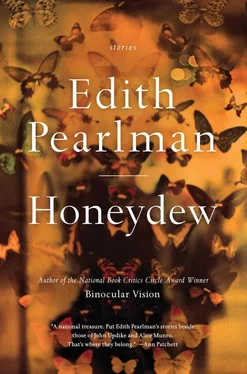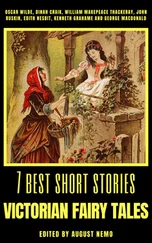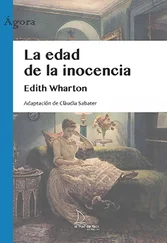That was the way of their courtship — Biff talking, Marcie listening with her eyes. Her high spirits, her healthy optimism, her clever chatter — all were restrained in order to perfect the new talent. Once she had been a thoughtless tease. Now she was a seductress.
They were married two years later. At the end of the celebration Marcie turned her back to her bridesmaids and threw the bouquet over her buttermilk shoulder. It was a wide flattish nosegay, all yellow flowers, and it looked rather like a garden hat. Helen caught it.
Helen had drawn Steve Folkster’s name. She’d known him since third grade. He was a diligent student, a good athlete, an everyday sort of fellow. But in Sallyann’s mother’s graceful script he became someone fresh, a young man with interests to reveal — a yearning for the mountains, say, or a passion for bees.
Helen did something unusual for those times — she telephoned Steve and, without preliminary remarks, invited him to the movies.
“I didn’t know you liked me,” he said that night, wonder steaming his face.
“I always liked you,” she fibbed.
“I’ve always been crazy about you,” he said. That claim probably wasn’t true either, but no matter. She liked him now. He was crazy about her now. And it turned out that he was a passionate woodworker, and that he was devoted to his three young nephews, and that he was slow to anger, and that he was able to forgive her spurts of unkindness.
And so, when Helen caught Marcie’s bouquet, she left the other bridesmaids and carried the flowers to Steve. He drew her into the harbor of his embrace.
She was protected by his devotion for the next forty years, through all their woes: his job lost, twice; a malformed infant who lived a week; her brother’s intractable depression; the prolonged defiant adolescence of each of their surviving children. Even when she briefly left him, haring after a woman who had no long-term use for her but who liked to be tied up, liked to be taken from behind — he gravely withstood the desertion, gravely welcomed her back.
There was nothing written on Sallyann’s paper.
In the corner of the porch, she folded it again and then unfolded it, looked at both sides several times, took off and put on her glasses. She held the paper up to the moon.
Was it accident? Was it the intervention of fate? Through the years that followed she sometimes remembered to be puzzled. At the time, though, she felt only blessed. A delay had been granted: a secret reprieve.
Many decades later she did mention the queer incident to her mother.
“No!” Her mother raised head and shoulders with such sudden force that the IV pole shook.
“Lie down, dear,” said Sallyann, glancing at the monitor.
Her mother subsided into the pillows. “I assumed that you drew Maurice.”
“I drew a blank.”
“You married Maurice,” her mother reminded her.
“Among others,” Sallyann reminded her in turn. “Franco and Nils — who knew then that they existed? Their names weren’t even in the hat.”
“Franco,” her mother murmured; and even though her voice had been weakened by the troublesome business of dying, it managed to convey the distaste she had felt for Sallyann’s middle husband.
Sallyann smoothed the pillows. “My gorgeous Franco had a bad character but he was passion made flesh. All cats are not gray at night…Did you really think they were?”
Her mother’s heart was unstoppably failing but she was in no pain and her mind was clear. “I thought — I still think — that people are more similar than different. I think that any reasonable couple can…invent its own romance…make its own happiness. See how right I was with Helen and Steve, with Marcie and Biff.”
“Marcie and Biff both play around, I hear.”
“Look who’s talking,” her mother said. Her affectionate hand found her daughter’s.
Sallyann wore contact lenses these days. Her still fiery hair was coiled around her head. She had fulfilled all possible promises: had become stunning, had become worldly, had become an important anthropologist, had lived in various places, had married and divorced and borne interesting children. Though nearly seventy she would probably marry yet again. It had become a gratifying habit, more enjoyable each time she did it; but the man in the fedora still occupied pride of place in her heart. Now she had returned to Godolphin to nurse her ancient, twice-widowed mother.
“So it was you who drew the blank,” her mother was whispering. “All along I thought it was June.”
No one will ever know the name of June’s intended. She pocketed the paper she had lifted from the hat. While the other three girls were reading theirs — or, in Sallyann’s case, trying to read hers — June was merely musing. Once home, she went into the bathroom and, face averted, tore the paper into many pieces and flushed the pieces away.
She too felt relief, deeper than Sallyann’s. She would not merely delay; she would retire. She could pretend that Celibacy was the name she had drawn; she was freed now to become that endearing thing: an old maid.
At college in Maine she had been languidly studying the history of music. Now she switched to biology; and in graduate school she made fungal morphology her specialty; and there, among the mushrooms, she found her life’s sustaining interest. It was a particular organelle called individually the parenthesome, though it always came in pairs. She spent her postdoc investigating its properties, and, with a succession of cherished lab assistants, she spent the years afterward discovering its many uses. She, and they, received awards and honorary degrees. When she was fifty she bought a cottage on a hill. She grew roses and dahlias and poppies. She was the cellist in an amateur string quartet that met faithfully every week and gave occasional recitals. She kept in touch with old friends.
“You knew there was a blank?” Sallyann asked her mother.
The old woman briefly lifted her chin: Yes.
“Did you put it into the hat?”
The barest side-to-side motion: No.
“But you let it stay there.”
This was not posed as a question; and she hadn’t the strength to reply; and anyway there were too many answers. Because she had been acting as agency, not executive: she’d been as passive as the fedora. Because chance allows itself an occasional collaborator. Because Helen needed an opportunity to discharge her malice. Because the one blank paper made the game more interesting. It was only a game, after all. Who could have known that the girls would play it so seriously. Who could have predicted that a woman addled by bereavement could wield such influence over four sprites with their lives ahead of them, with choices thick at their feet.
Sallyann saw that her mother could no longer speak. She bent over the loved face. “You did a marvelous thing,” she said. “We are all happy enough.”
Of all the books Mindy’s father received during his illness and convalescence, his declared favorite was Legends of the Jews. Fat warty Rabbi Goldstone lugged the set into the sickroom on one of his unwelcome visits and deposited all six volumes with a godly thump onto the bed, as if the learning inside might overcome ills of the flesh. Mindy’s mother, Roz, gave the rabbi one of her ambiguous smiles — this one, Mindy knew, meant “Strike me dead if I open one of those tomes.” The book Roz grabbed from a stack sent by patients was B.F.’s Daughter —the first J. P. Marquand since the war. She admired Marquand’s well-bred characters.
As for Mindy and her two sisters, they liked best the optical-illusion book, Masters of Deception, brought to the door by the maid of Mrs. Julius Barrengos, who lived in a grand house on the next street. Masters of Deception ’s illustrations included paintings and engravings by Dalí and Magritte and Escher. Impossible things made possible — a hat floating between clouds like a bird, a watch dripping like syrup. Transformation was the game: just what the Margolis girls were looking for.
Читать дальше












